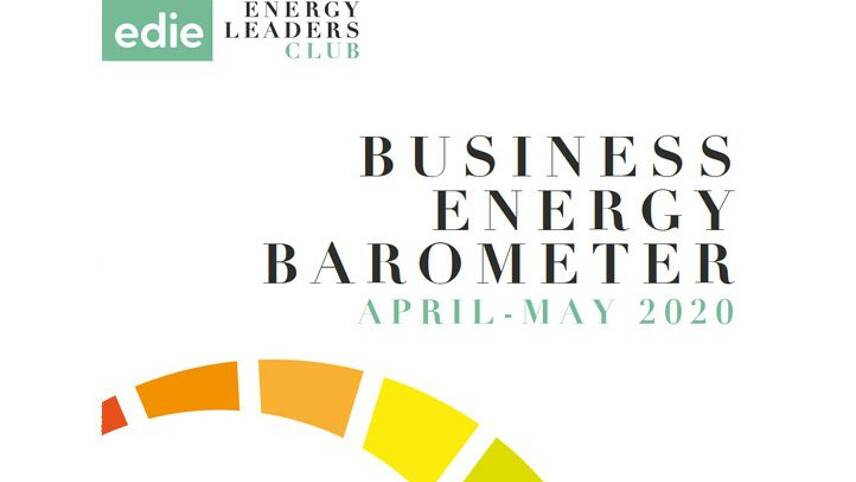Register for free and continue reading
Join our growing army of changemakers and get unlimited access to our premium content

The Barometer results and report are free to download
Inspired by edie’s Energy Leaders Club, the inaugural Business Energy Barometer report maps out current trends and key developments for UK energy managers.
The Barometer results are being discussed today during edie’s Net-Zero Carbon online event, an afternoon of back-to-back online sessions focused on helping businesses build net-zero carbon strategies (click here to register for the free event).
— READ THE BUSINESS ENERGY BAROMETER REPORT HERE —
“After years of hard work, Britain’s energy managers had just reached a crucial inflection point: the Government had declared a climate emergency and businesses large and small were duly rolling out ambitious net-zero carbon targets. And then came Covid-19,” edie’s content director Luke Nicholls said.
“Whilst this edition of the Barometer does provide a glimpse of the energy management challenges that lie ahead in the wake of the pandemic, it also offers good reason for optimism. And in the pages that follow, you’ll see that the so-called four D’s – decarbonisation, decentralisation, digitisation and democratisation – are all moving in the right direction; and engagement around energy.”
Finance and behaviours
The Barometer, which has been published as part of edie’s Net-Zero Week, outlines some of the main barriers that energy managers face, with funding and access to finance the highest responded answer at 49%. Behaviour change and short-term business outlooks were also highly voted by the 50+ energy managers that took the Barometer survey.
When asked to rate the level of engagement that different functions across the business have with energy use/efficiency, corporate communications was ranked as the most engaged department, with a weighted average of 3.72 – up from a weighted average of 3.04 this time last year.
In fact, based on weighted averages over time, engagement with energy management is slightly up across the board. The chief executive and corporate board, for example – arguably the two most important stakeholder segments to have engaged with energy management – are both seemingly more engaged in 2020 than they were in 2019. In total, 27% of CEOs are “very engaged” with energy use/efficiency, compared with 17% last year; while 24% of corporate boards are “very engaged”, compared with 21% last year.
Technology optimism
Despite the disruption caused by the coronavirus pandemic, many energy managers are focusing on technology solutions for the year ahead.
The top priority among energy managers is energy efficiency technologies – cited as a ‘medium’ priority for 27% of respondents, a ‘high’ priority by 38% of respondents, and a ‘business-critical’ priority by 16% of respondents.
The second-highest energy management priority based on a weighted average within the Barometer was data management/ optimisation. Whilst this was only deemed to be a ‘business-critical’ priority by 8% of respondents, 43% gave it a ‘high’ priority and 32% gave it a ‘medium’ priority. Adjoined to this is building controls/building energy management systems (BEMS) – a ‘business critical’ priority for 14% of respondents and a ‘high’ priority for 22% of respondents.
The technology area deemed to hold the biggest opportunity for future energy strategy was the Internet of Things – cited as a ‘medium’ or ‘high’ opportunity by 27% and 30% of respondents respectively, and as a ‘business-critical’ priority by a further 5% of respondents.
Energy managers appear largely optimistic about key policy commitments, with 75% believing that the UK will hit a net-zero target in the aspect of decarbonising heat. the Committee on Climate Change (CCC) claimed that the share of ‘low-carbon’ heating systems – primarily heat pumps, district heating networks and hydrogen-fuelled boilers – would need to increase from around 5% today to at least 90% for homes, and 100% for businesses, by the net-zero target year of 2050. However, only 24% of respondents actually had a decarbonisation plan in place for heat within their organisation.
Energy Leaders
edie’s Business Energy Barometer has been primarily developed for the Energy Leaders Club – an exclusive, member-only programme of free networking events and workshops for in-house energy managers and practitioners.
Membership of the Club grants access to an annual programme of free, informal peer-to-peer networking events, CPD-certified breakfast briefings and in-depth learning events which are closed to nonmembers.
Energy managers can find out more about the Energy Leaders CLub and submit their membership application here.
All edie readers can download the full Business Energy Barometer results for free, here.
edie staff


Please login or Register to leave a comment.